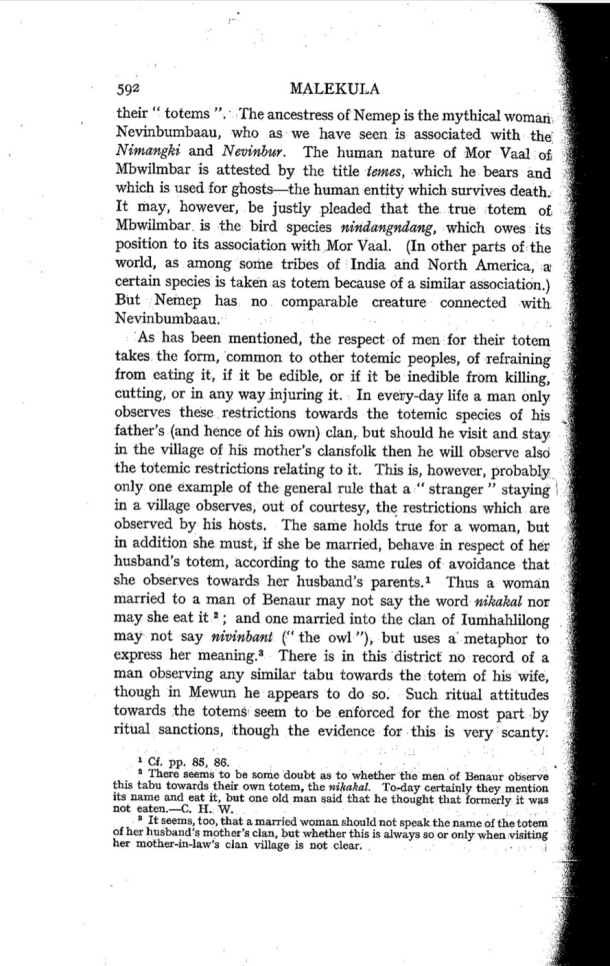|
|  [Note: this transcription was produced by an automatic OCR engine]
59¢ MALEKULA
their " totcms ". The ancestress of Ncmep is the mythical woman
Nevinbumbaau, who as we have seen is associated with the
Nimangki and N21/inbur. The human nature of Mor Vaal oi
Mbwilmbar is attested by the title tmzas, which he bears and
which is used for ghosts—the human entity which survives death.
It may, however, be justly pleaded that the true totem oi
Mbwilmbar is the bird species nindangndang, which owes its
position to its association with Mor Vaal. (In other parts of the
world, as among some tribes oi India and North America, a
certain species is taken as totem because of a similar association)
But Nernep has no comparable creature connected with
Nevinbumbaau.
As has been mentioned, the respect of mcn for their totem
takes the form, common to other totemic peoples, of refraining
from eating it, if it be edible, or if it be inedible from killing,
cutting, or in any way injuring it. In every-day lite a man only
observes these restrictions towards the totemic species of his
father’s (and hence of his own) clan, but should he visit and stay
in the village oi his mother's clansfolk then he will obscrvc also
the totemic restrictions relating to it. This is, however, probably
only one example of the general rule that a " stranger " staying
in a village observes, out of courtesy, the restrictions which are
observed by his hosts. The same holds true for a woman, but
in addition she must, if she be married, behave in respect of her
husband's totem, according to the sarnc rules of avoidance that
she observes towards her husband's parents} Thus a woman
married to a man of Benaur may not say the word nikakal nor
may she eat it ' ; and one married into the clan of Iumhahlilong
may not say nivinbanl ("the owl "), but uses a' metaphor to
express her meaning.‘ There is in this district no record oi a
man observing any similar tabu towards the totem of his wife,
though in Mewun he appears to do so. Such ritual attitudes
towards the totems seem to be enforced for the most part by
ritual sanctions, though the evidence for this is very scanty.
1 Cl. pp. es, as. -
- There seems m be some aohhc as to whether the men 0! Bnnaur Observe
this tabu towards Lheir own totem, the mumhz. To-day certainly they mention
its name and BBC it, but one old man Bflld that he thought. that (crrmcrly it was
hat eate'n.—C, 1-1. W.
- It seems, too, that a married Wumflh siwhu not speak the name oi the totem
cl her l11sbaIJd'S mother’: chm, but whether this ls always so or only when visiting
her mother-in-law's nah village is not clear. l
|